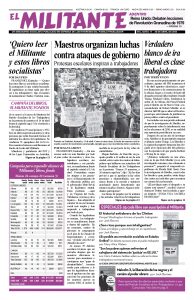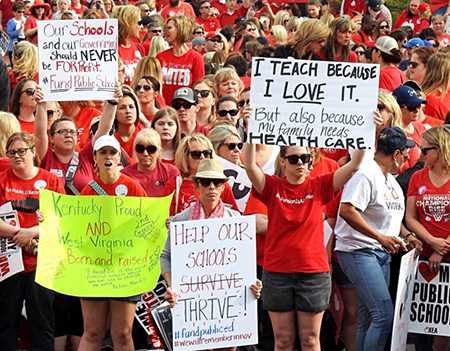FRANKFORT, Ky. — In a scene increasingly familiar across the country, thousands of teachers, other school workers and students and supporters rallied outside the state Capitol here April 13. They were protesting attacks by Gov. Matt Bevin and the state legislature on retirement funds and money for public education.
These actions — here and in West Virginia, Oklahoma, Arizona and elsewhere — have tended to take on the character of a broader social movement. They have inspired workers across the country.
As the legislators met for the final two days of their 60-day session, workers demonstrated outside and massed inside the Capitol building. Some secured seats in the galleries over the legislative chambers. At one point hundreds assembled on the floor of the House, chanting, “Where is Bevin? Show your face!”
Those who couldn’t get in continued to rally and march outside. At least 39 school districts were shut as teachers got leaves or came down with “sewer flu,” a disease that refers to how legislators had passed a bill turning new teachers’ pensions into 401(k) accounts by attaching it to a sewage bill. This was one of several sizable rallies by workers and students at the Capitol in the last few weeks.
“I work at a K-12 school in a small town,” said Megan Berketis, a young teacher from Danville, 43 miles south of here. She was one of hundreds of workers from across the state who talked with members of the Socialist Workers Party at the protest. “There are 33 teachers, and 26 of us are here today. We haven’t had any rallies back home, but before the sewage-pension bill passed, we had several ‘walk-ins.’ We gathered outside the school with some of the students, and all walked in together to show we’re united and strong.”
Early morning pickets of school workers all dressed in red, followed by walk-ins, have been a common feature of the recent mobilizations across the country.
Teachers in Kentucky aren’t eligible for Social Security, so they depend entirely for retirement on their pensions. The protests made the politicians back off from a proposal to cut the cost-of-living adjustments for retired teachers. But in a divisive move, the sewage bill puts teachers hired after Jan. 1, 2019, in a 401(k)-type plan. Everyone has to pay into it, the money is pooled and some government-hired “professional” sticks it in the stock market. If he picks well — and assuming the capitalist market never crashes — you get paid. If not, you’re out of luck.
The Kentucky Education Association, the teachers’ union, urged members who could “legally be in Frankfort” to come April 13 for a “Legislative Action Day.” Initially, KEA officials opposed holding a rally, instead saying teachers should concentrate on lobbying legislators and look to the November elections to make changes. After it became clear that county union chapters were organizing to go to Frankfort, the officials lent their support.
This discussion and debate over which way forward continued at the rally. While many thought lobbying and working to throw the bums out and get new ones was the way to go, others thought it was relying on themselves, building the protests and solidarity with other workers that could make the difference. Many were influenced by recent mass union protests and gains in West Virginia and Oklahoma.
Several weeks ago the state legislature passed a budget, which increased some money for schools but was “balanced” by a bundle of sales tax assessments that will hit working people. Bevin attacked the new funding and vetoed the budget. But as the teachers mobilized, legislators overrode his veto April 13 and passed it. Many people at the rally thought this was important because it contains more funding for public education, including some relief to school districts in eastern Kentucky’s coal-mining areas, which have been devastated by the ongoing capitalist economic crisis and dramatic decline in coal production in recent years.
‘There is no pie’
“They talk as if there is a giant pie, and if someone gets a bigger slice, then yours gets smaller,” Berketis said. “But there is no pie. We shouldn’t have to pay more taxes. Money for education should come from the companies that make a lot of profit.”
Teachers and workers throughout the state were furious when Bevin expressed the reaction of the propertied rulers to the protest by saying, “I guarantee you somewhere in Kentucky today, a child was sexually assaulted that was left at home because there was nobody there to watch them.”
The firestorm of protest made him “apologize,” but he refused to retract what he said.
“Among many workers here there is a strong desire for a win for teachers and school workers,” retired coal truck driver Clinton Lafferty told SWP members when they knocked on his door while campaigning in Paintsville in eastern Kentucky April 4. “It’s a dirty deal,” he said, referring to the attacks on teachers’ pensions and on education. “You work all your life, and it’s for nothing.”
“I hope workers in Kentucky get a chance to experience the kind of solidarity and brotherhood we did in West Virginia,” school bus driver Scott Whitt told the Militant by phone from Beckley. “Kentucky has the shared history with the miners’ union that made the difference in our fight. If labor is strong, the teachers can win.”
Oklahoma teachers end walkout for now, debate what’s next
OKLAHOMA CITY — After weeks of preparations, 10 days of teachers walking out of schools across the state and traveling to protest at the state Capitol, a seven-day 110-mile march from Tulsa to Oklahoma City, and countless early morning “walk-ins,” teachers and other school workers in Oklahoma suspended their walkout April 13.
“Our formal efforts to lobby elected leaders have achieved all they will be able to accomplish this legislative session,” Alicia Priest, president of the Oklahoma Education Association, the state’s largest teachers union, said at an April 12 press conference announcing the decision. Continued advocacy needs to happen at the ballot box, she argued.
Workers were divided in their response to the call to end the walkout. Hundreds continued to rally outside the Capitol the next day, saying they would continue the fight. Some, whose schools were not in session, decided to go there the following Monday, April 16, as well. Many debated perspectives on a closed teacher Facebook group called “Oklahoma Teacher Walkout — The Time is Now!” It started at the outset of the protests and now has some 70,000 followers.
“The fight is not over in us and we believe that it’s very important to keep going,” Christina Floyd, a teacher at Berryhill Public Schools in Tulsa, told Oklahoma News Channel 4. She had been at the Capitol every day since April 2.
Through their mobilizations workers won $50 million in increased school funding in addition to a $6,100 wage increase for teachers and $1,250 for other workers, their first pay raise in 10 years.
Teachers here face the effects of years of budget cuts, pushed as capitalist crisis conditions deepened, and ruling class indifference. Textbooks are a decade old and falling apart. About 20 percent of the state’s schools are only open four days a week, for longer hours, to cut costs. So the gains teachers won fell substantially short of their demands.
The discussion on how they can win more has already started, building on the rich lessons of their fight and others taking place across the country.
Arizona school workers vote on whether to strike or not
Teachers, other school workers, parents and students rallied outside their schools across Arizona April 11 and then walked in together to start classes. According to Arizona Educators United, which started the RedForEd movement there and called for the walk-ins, some 110,000 people participated.
The next day Gov. Doug Ducey announced pay raises for teachers of 9 percent this year and 5 percent each of the following two years. Only two days earlier Ducey had called the group a “political circus” and refused to meet with its organizers.
Ducey didn’t mention any of the group’s other demands, including increased funding for schools and pay raises for other staff — librarians, custodians, cafeteria workers, health assistants and others.
This is “an attempt to stop whatever actions we may have been taking,” Arizona Educators United founder Noah Karvelis said in a Facebook video to the group’s 40,000 members.
“We can’t go back to work” and say to co-workers, “‘Hey, my pay is great; sorry you’re still making minimum wage,’” teacher Derek Harris told the Arizona Daily Star April 12.
The AEU has called for an April 17-19 vote to decide on whether to call a strike.


